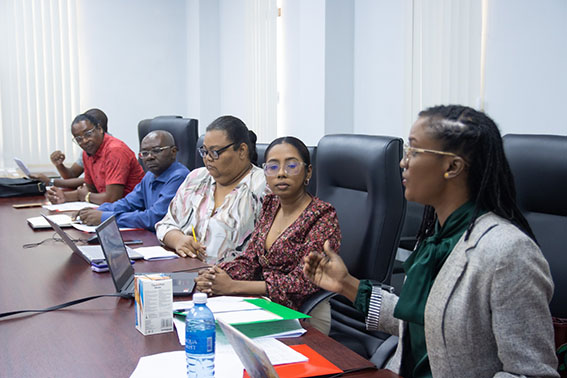The Ministry of Health’s Vector Control Services, in collaboration with the Guyana Global Fund Country Coordinating Mechanism (CCM), yesterday hosted the Malaria Country Dialogue at the Ministry’s boardroom, Brickdam, Georgetown, a release from the Ministry of Health (MoH) stated.
This dialogue, which offered a platform to assess the status of malaria in Guyana and reflect on progress made, and strategies for the next phase of malaria elimination efforts, brought together key stakeholders, including representatives from the Miners’ Association, the Ministry of Finance, the Ministry of Amerindian Affairs, the Guyana Geology and Mines Commission (GGMC), CCM members and other healthcare workers. Also present were Chief Medical Officer, Dr Narine Singh; Director Vector Control Services, Dr Reza Niles-Robin; and Deputy National Focal Point Malaria, Dr Olivia Vallz.
Minister of Health, Dr Frank Anthony, who delivered opening remarks, highlighted the MoH’s ambition to transition from malaria control to elimination. He noted that while Guyana has benefited from Global Fund grants addressing HIV, tuberculosis, and malaria, the country is gradually becoming ineligible for such funding.
“This may be the last malaria grant from the Global Fund. However, our focus is on eliminating the disease. Guyana’s strategy must shift to align with successful elimination efforts seen in neighbouring Suriname, where they are now awaiting validation from the World Health Organization (WHO).”
Dr Anthony emphasised that eliminating malaria requires innovation, targeted interventions, and region-specific approaches. He outlined a pilot programme taking place in Region Nine in collaboration with Harvard University in the United States, which uses geospatial mapping and AI technology to identify and treat areas with high mosquito breeding activity.
The Minister also addressed the broader goal of eliminating by 2030, neglected infectious diseases in Guyana including lymphatic filariasis, Chagas disease, leishmaniasis, and leprosy. He stressed the importance of eliminating diseases to free up resources for addressing non-communicable diseases such as diabetes and hypertension.
The dialogue concluded with a commitment from stakeholders to align their efforts with the MoH’s goal of malaria elimination by adopting innovative strategies and fostering collaboration across sectors, the release added.










